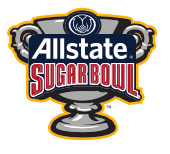
Back Sugar Bowl German Sugar Bowl Spanish Sugar Bowl French シュガーボウル Japanese Sugar Bowl Portuguese Sugar Bowl SIMPLE Sugar Bowl (match) Swedish 砂糖碗 Chinese
| Sugar Bowl | |
|---|---|
| Allstate Sugar Bowl | |
 | |
| Stadium | Caesars Superdome |
| Location | New Orleans, Louisiana |
| Previous stadiums | Tulane Stadium (1934–1974) |
| Temporary venue | Georgia Dome, Atlanta, Georgia (2006)[a] |
| Operated | 1935–present |
| Championship affiliation | |
| Conference tie-ins | SEC (unofficial 1935–1975, official 1976–present) Big 12 (2015–present) |
| Payout | US$17 million per team (As of 2014[update])[1] |
| Sponsors | |
| Former names | |
| |
| 2022 season matchup | |
| Kansas State vs. Alabama (Alabama 45–20) | |
| 2023 season matchup | |
| Washington vs. Texas (Washington 37–31) | |
The Sugar Bowl is an annual American college football bowl game played in New Orleans, Louisiana. Played annually since January 1, 1935, it is tied with the Orange Bowl and Sun Bowl as the second-oldest bowl games in the country, surpassed only by the Rose Bowl Game.[2]
The Sugar Bowl was originally played at Tulane Stadium before moving to the Superdome in 1975. When the Superdome and the rest of the city suffered damage due to both the winds from and the flooding in the aftermath of Hurricane Katrina in 2005, the Sugar Bowl was temporarily moved to the Georgia Dome in Atlanta in 2006. Since 2007, the game has been sponsored by Allstate and officially known as the Allstate Sugar Bowl. Previous sponsors include Nokia (1996–2006) and USF&G Financial Services (1988–1995).
The Sugar Bowl has had a longstanding—albeit not exclusive—relationship with the Southeastern Conference (SEC) (which once had a member institution based in New Orleans, Tulane University; another Louisiana school, Louisiana State University (LSU) in Baton Rouge, is still in the SEC today). Indeed, the Sugar Bowl did not feature an SEC team only four times in its first 60 editions, and an SEC team played in the game in every year but one from 1950 to 1995. The SEC's opponent varied from year to year, but prior to the advent of the Bowl Championship Series, it was often a member of the Big Eight, the SWC, or a major independent.
The Sugar Bowl-SEC relationship has been altered over the past twenty years due to conference realignments and the emergence of a series of coalitions and alliances intending to produce an undisputed national champion in college football, but the ties between the Sugar Bowl and the SEC have persisted and have recently been strengthened. Since 2015, the Sugar Bowl, along with the Rose, Orange, Cotton, Peach, and Fiesta bowls, is one of the "New Year's Six" bowls in rotation for the College Football Playoff. It hosted a playoff semifinal following the 2014, 2017, and 2020 seasons, and will next host one following the 2023 season. In other years, it will feature the best available teams from SEC and the Big 12 conferences,[3] an arrangement nearly identical with the relationship between the Rose Bowl and the champions of the Big Ten and Pac-12.
As a member of the Bowl Championship Series, the Sugar Bowl hosted the BCS National Championship Game twice, in 2000 and 2004, as the national championship rotated between the bowls themselves until 2006 when the national championship game became a standalone event. Since the 2014 season, the Sugar Bowl has been in the rotation of bowls—commonly referred to as the New Year's Six—that host College Football Playoff (CFP) semifinal games once every three years.

Cite error: There are <ref group=lower-alpha> tags or {{efn}} templates on this page, but the references will not show without a {{reflist|group=lower-alpha}} template or {{notelist}} template (see the help page).
- ^ "2016-2017 College Football Bowl Game Schedule". CollegeFootballPoll.com. Retrieved December 29, 2016.
- ^ "{title}" (PDF). Archived from the original (PDF) on 2017-05-10. Retrieved 2017-01-03.
- ^ "New Orleans to host Big 12-SEC game". ESPN. 2012-11-07. Retrieved 2012-11-15.
© MMXXIII Rich X Search. We shall prevail. All rights reserved. Rich X Search